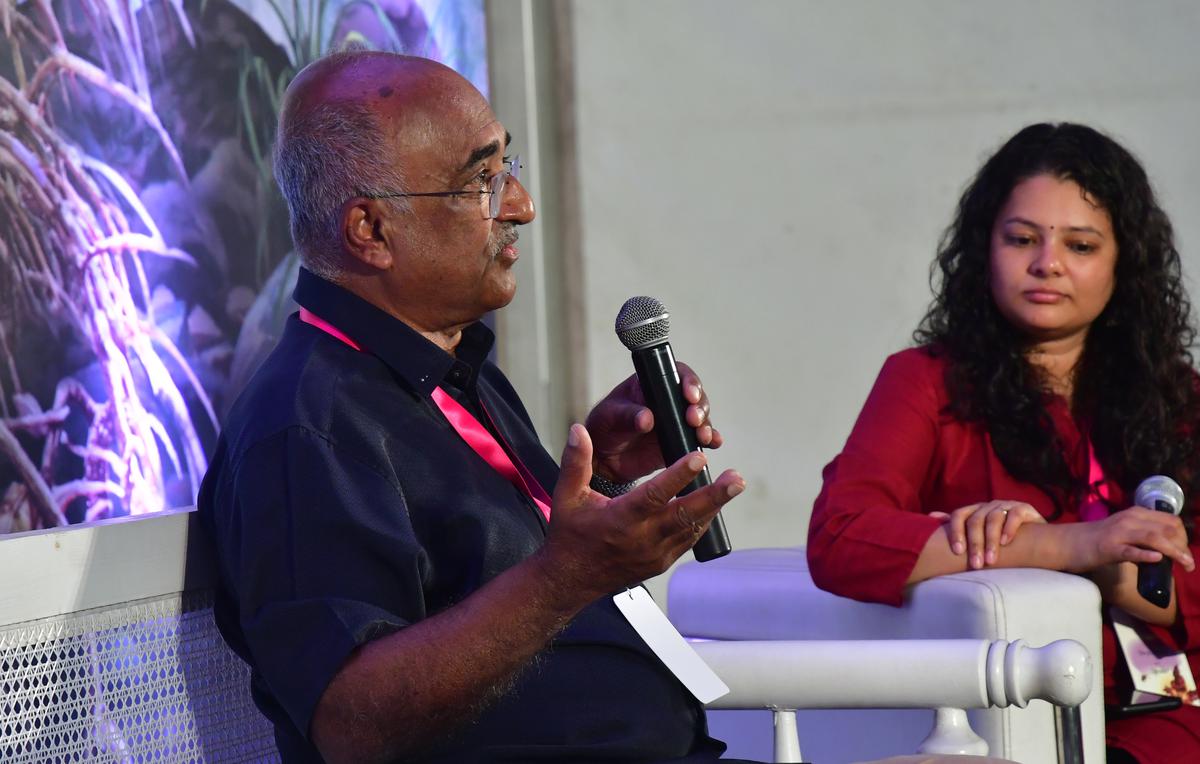“Bengaluru is a city in search of an identity,” said journalist Shrabonti Bagchi, who was mediating a session titled Unboxing Bengaluru: The City of New Beginnings, at the Bangalore Literature Festival, which began here on Saturday.
The conversation, which also included authors Malini Goyal and Prashanth Prakash, delved into these writers’ recently released book Unboxing Bengaluru: The City Of New Beginnings, springboarding into the larger city and what its core identity really is today.

How the Light Gets In: Stories of India’s Poorest Mothers – Ashok Alexander with Divya Shekhar at the Bangalore Literature Festival on Saturday.
| Photo Credit:
K. MURALI KUMAR
“This book does a great job of capturing Bengaluru’s energy, its dynamism and the certain indefensible charm of the city,” said Ms. Bagchi, who described it as a city of new beginnings with a changing DNA,” while Ms. Goyal described Bengaluru as a city that offers different types of Bengaluru all coexisting together. “We felt that the city has to come together; we need to unbox the city for its people and for the world to understand it as well,” she added.
She also spoke about how the city was more than just about start-ups; the book, she hoped, would offer readers a more holistic view of the city. “We wanted to envisage it as a contemporary biography of Bengaluru, and capturing that was a challenge, but it is definitely an interesting part of this book,” she said.

Uprisings in Kodagu and Dakshina Kannada in the Early 1800s by Purushothama Bilimale and Vijay Poonacha Thambanda (right) at the Bangalore Literature Festival on Saturday.
| Photo Credit:
K. MURALI KUMAR
Yet, the start-up culture is clearly an important aspect of the city. At the session, Mr. Prakash delved into the genesis of this aspect of the city. “Everybody came to Bengaluru to start fresh with a dream, which has a beginning, and I think that’s the core narrative that is presented,” he said, adding that the city has encountered immense migration and continues to. “Migration of talent from multiple places was unique to this city, I don’t think I’ve seen such high-quality talent, where people want actually to build and create something, anywhere else,” he said.
Revising history
On the other hand, Bengaluru’s many history enthusiasts were in for a treat at a session titled Bangalore through the Centuries with urban planner Naresh Narasimhan and Ameena Shaheen. Focusing on M. Fazlul Hasan’s iconic book, Bangalore Through the Centuries, which was reprinted after 53 years, thanks to Mr. Narasimhan’s efforts, the session offered insights into the original book as well as the ancient history and lost magic of the Garden City.
This book, essentially a compilation and a comprehensive study of the history of Bengaluru, has also been interpreted and referred to as source material for many more books about Bengaluru after the 1970s. “My father was not a historian; he was an administrator, but this book was his magnum opus,” said Ameena Shaheen, daughter of Fazlul Hasan, who was instrumental in proofreading her father’s work.

Sudha Murty interacting and signing books at Bangalore Literature Festival on Saturday.
| Photo Credit:
K. MURALI KUMAR
In a presentation, Mr. Narasimhan regaled his audience with stories of Bengaluru’s complex history, architecture, origins and myths, emphasising something we often forget: Bengaluru is not a young city.
“The history of Bengaluru goes back 10 centuries before King Kempegowda’s founding; it was a place of settlement even during the Ganga Dynasty,” he said, going on to offer other interesting facts, including about the vastness of Tipu Sultan’s empire, ancient sanitation systems and how Paul Fernandes’ wonderful artworks are now part of the city’s airport. “Our city is a scroll, “he believes. “And we have to decide what to write.”

COMMents
SHARE